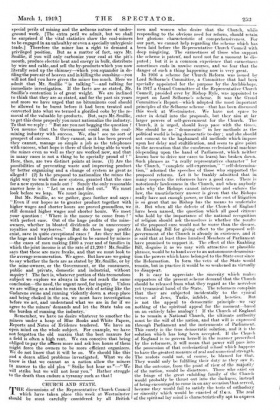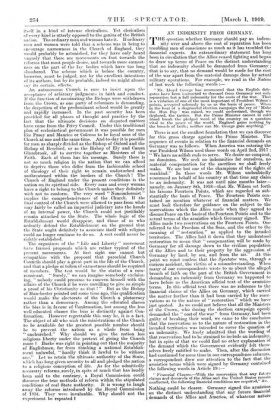CHURCH AND STATE.
THE discussions of the Representative Church Council which have taken place this week at Westminster should be most carefully considered by all British
men and women who desire that the Church, while responding to the obvious need for reform, should retain her glorious characteristic of comprehensiveness. For our part, we cannot help regarding the scheme which has been laid before the Representative Church Council with deep misgiving. The earnestness of those who support the scheme is patent, and need not for a moment be dis- puted ; but it is a common experience that earnestness sometimes ends in unwise courses, and we fear that the danger of such a thing happening now is very great.
In 1916 a scheme for Church Reform was issued by Lord Selborne's Committee, a Committee that had been specially appointed for the purpose by the Archbishops. In 1917 a Grand Committee of the Representative Church Council, presided over by Bishop Ryle, was appointed to report on Lord Selborne's scheme. It was the Grand Committee's Report—which adopted the most important principles of the Selborne scheme—that has been discussed this week at Westminster. We have not space to enter in detail into the proposals, but they aim at far larger powers of self-government for the Church. The Church, it is urged, should keep pace with the times. She should be as ." democratic " in her methods as the political world is being democratic to-day ; and she should not consent to the haphazard old methods which impose upon her delay and stultification, and seem to give point to the accusation that the cumbrous ecclesiastical machine (depending upon the hand of Parliament, which neither knows how to drive nor cares to learn) has broken down. Such phrases as "a really representative character" for the Church, "complete self-expression," " self-determina- tion," adorned the speeches of those who supported the proposed reforms. Let it be frankly admitted that in many respects the reformers have a good case. There is notoriously lawlessness in the Church, and when anybody asks why the Bishops cannot intervene and enforce the law, the unsatisfactory answer is given that the Bishops really have not enough power, or that the cost of litigation is so great that no Bishop has the means to undertake it. But when all the defects of the Church of England have been named, the question which all good citizens who hold by the importance of the national recognition of religion should ask themselves is whether the results of the proposed cure would not be worse than the disease. An Enabling Bill for giving effect to the proposed self- government of the Church is already in existence, and it is said that at least three hundred Members of Parliament have promised to support it. The effect of this Enabling Bill, disguise it as we may with attractive or plausible phrases, would be to hand over to an autonomous denomina- tion the powers which have belonged to the State ever since the Reformation. In form the veto of the State would remain, but in practice it would be so weakened as virtually to disappear. It is easy to appreciate the sincerity which makes supporters of the present scheme demand that the Church should be released froM what they regard as the nerveless yet tyrannical hand of the State. The reformers complain that they are subjected incidentally to the cynical vetoes of Jews, Turks, infidels, and heretics. But is not the appeal to democratic principle—we say nothing of the spiritual appeal for the moment—based on an entirely false analogy ? If the Church of England is to remain a National Church, the ultimate authority must be the will of the nation, and that will is expressed through Parliament and the instruments of Parliament. This surely is the true democratic solution, and it is the solution which has long been accepted. If the Church of England is to govern herself in the manlier prescribed by the reformers, it will mean that power will pass into the possession of that ecclesiastical school which happens to have the greatest measure of zeal and numerical strength. The zealots could not, of course, be blamed for that. They would only be fulfilling their duty as they 88W it. But the outcome, from the point of view of the majority of the nation, would be disastrous. Those who exist on the fringe of the great enfolding family of the Church would probably be thrust out into the darkness, instead of being encouraged to conic in on any occasion that served, because they would fail to satisfy the tests of orthodoxy or sincerity which would be exacted of the n. The zeal of the spiritual lay mind is characteristically apt to express
itself in a kind of intense clericalism. Yet clericalism of every kind is utterly opposed to the genius of the British • nation. The ordinary man and woman hate it. If ordinary men and women were told that a scheme was in being to encourage narrowness in the Church of England, they would probably be astonished, for they have only heard vaguely that there are movements on foot towards the reforms that most people desire, and towards more earnest- ness on the part of the lay bodies which have too long slumbered. The scheme which is before the country, however, must be judged, not by the excellent intentions of its authors, but by its probable, indeed we might almost say its certain, effects.
An autonomous Church is sure to insist upon the acceptance of arbitrary judgments in faith and conduct. If the function of nominating the Bishops were withdrawn from the Crown, as one party of reformers is demanding, the despotism of the predominant school would be greatly and rapidly increased. In the past security has been provided for all phases of thought and practice by the fact that the ultimate decisions on disputed matters have come from the Privy Council. Under this traditional plan of ecclesiastical government it was possible for men like Pusey and Maurice or Colenso to be loyal eons of the Church at one and the same time. And to-day it is possible for men as sharply divided as the Bishop of Oxford and the Bishop of Hereford, or as the Bishop of Ely and Canon Olazebrook, all to survive together as. Ministers of the Faith. Each of them has his message. Surely there is not so much religion in the nation that we can afford to deprive those who differ from the fashionable school of theology of their right to remain undisturbed and unthreatened within the borders of the Church I The Church of England under the present conditions is the nation on its spiritual side. Every man and every woman have a right to belong to the Church unless they definitely wish not to conform. The very word " Nonconformist " implies the comprehensiveness of the Church. If the final control of the Church were allowed to pass from what may fairly be called an impartial judiciary into the hands of an internal power, the Church could not justifiably remain attached to the State. The whole logic of the Establishment would disappear, and those of us who ardently defend the Establishment on the ground that the State ought definitely to associate itself with religion could no longer continue to do so. A sect could never be rightly established.
The organizers of the " Life and Liberty " movement have framed proposals which are rather typical of the present movements. At first sight one cannot but sympathize with the proposal that parochial Church Councils should play a great part in the life of the Church, and that a pledge or token of earnestness should be required of members. The test would be the status of a com- municant. " Surely," we can imagine somebody exclaim- ing, " nobody could presume to concern himself with the affairs of the Church if he were unwilling to give so simple a proof of his Christianity as that ! " But as the Bishop of Manchester pointed out some time ago, this qualification would make the electorate of the Church a plutocracy rather than a democracy. Among the educated classes the bias is in favour of Confirmation, but among the less well educated classes the bias is distinctly against Con- firmation. However regrettable this may be, it is a fact. The object of all who wish the ministrations of the Church to be available for the greatest possible number should be to prevent the nation as a whole from being " unchurched." Why should we give the nation leas religious liberty under the pretext of giving the Church more ? Burke was right in pointing out that the majority of Englishmen, far from thinking a national Establish- ment unlawful, " hardly think it lawful to be without OW." Let us retain the ultimate authority of the State, which has long given security to all and pledged the nation to a religious conception of iife. As for the admittedly necessary reforms, surely, in spite of much that has loudly been said to the contrary, a Royal Commission could discover the true methods of reform within the stipulated conditions of real State authority. It is wrong to laugh away the reforms. introduced by the Royal Commission of 1834. They were invaluable. Why should not the experiment be repeated I



































 Previous page
Previous page